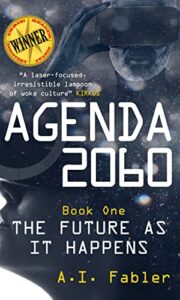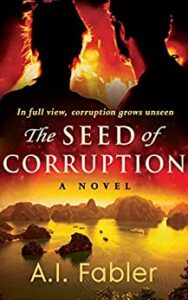
A Song for Leonard received a 4+ star review, making it an IndieReader Approved title.
Following find an interview with author A.I. Fabler.
What is the name of the book and when was it published?
A Song for Leonard by A.I. Fabler is due for release on January 26th, 2023
What’s the book’s first line?
“How long is three minutes when every second commands your attention, and every …”
What’s the book about? Give us the “pitch”.
A beautiful young singer-songwriter ends up dead on a Madison Avenue sidewalk, a gun in her hand — just another New York mugging, except she was the mugger. Set in a tense and lawless Seventies New York, the unexplained elements surrounding her death are gradually revealed through the lyrics of the songs she left behind, as her intended victim is forced to defend himself, uncovering evidence of police persecution and religious bigotry, his own life being placed in jeopardy the closer he gets to the truth.
What inspired you to write the book? A particular person? An event?
Having twice been mugged in Manhattan in the late Seventies, I long carried an image of one of the female drug addicts who had pulled a gun on me, wondering what had brought her to that point. Out of that experience I wrote a screenplay entitled, “Bedeviled: A Song for Leonard Cohen”, which won the Empire Drama Award at the NY Screenwriting Competition and the Cannes Competition in 2017. This novel sprang out of the screenplay.
What’s the main reason someone should really read this book?
In addition to creating a tension-laden mystery with many unexpected twists and turns, I was intent on conveying New York City and its noir culture at that time. For those who lived through that period it will be a reminder of the extent to which social attitudes have change. And to those who have a romantic notion of the Seventies, it will be a sobering immersion in reality.
What’s the most distinctive thing about the main character? Who-real or fictional-would you say the character reminds you of?
Charles Bateman, the intended victim who is forced to defend himself, is a flawed hero, somewhat selfish and hedonistic, who can’t shake off his sense of guilt for what might have been if he had acted differently. His pursuit of his own redemption is somewhat Shakespearean.
When did you first decide to become an author?
At the age of twelve.

This is the third book I have published under the pen name of A.I. Fabler, following “AGENDA 2060: The Future as It Happens” (described by Kirkus Reviews as “A laser-focused, irresistible lampoon of woke culture”); and “The Seed of Corruption”, a literary thriller that sends a wildlife artist into Vietnam in search of a forger during the 2004 SARS outbreak. I have another novel due for release in 2023, which is Book Two in the AGENDA 2060 series.
What do you do for work when you’re not writing?
I research and write full-time.
How much time do you generally spend on your writing?
6 to 8 hours daily.

I don’t have to self-censor in order to get past the “sensitivity readers”. I have to remind myself not to neglect marketing chores.
What’s a great piece of advice that you can share with fellow indie authors?
Get the written work as good as you can possibly make it, and then get a professional editor. You’ll be amazed at how much better the final MS will be.
Would you go traditional if a publisher came calling? If so, why?
A large publishing house can open doors to sales of international rights and movie adaptations, but will still be demanding of your time for marketing. Self-publishing allows the writer to get on with it, without waiting in hope. But I would welcome a good publisher to come calling.
Is there something in particular that motivates you (fame? fortune?)
Getting the story out there to be read and having someone say (as a critic of “A Song for Leonard” has just written). “Fabler is a great storyteller. Books like this are what good fiction is about”.
Which writer, living or dead, do you most admire?
John Le Carré for consistently high standards and output.
Which book do you wish you could have written?
Orwell’s “1984”
